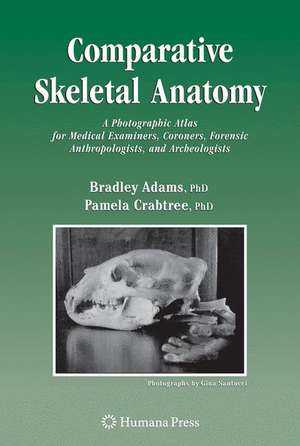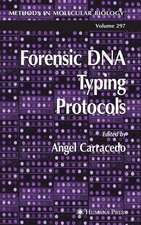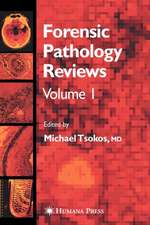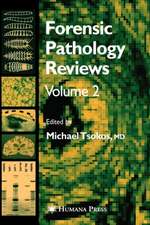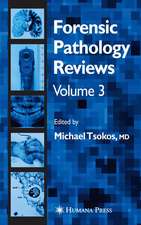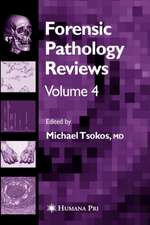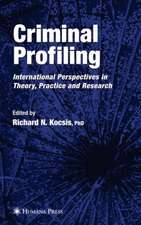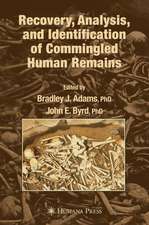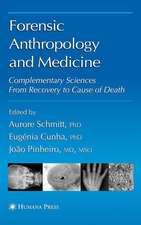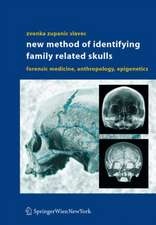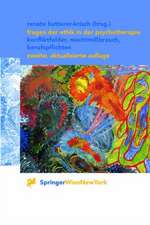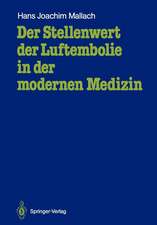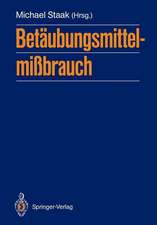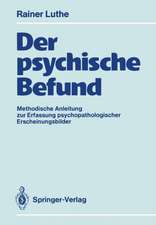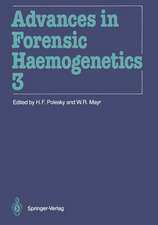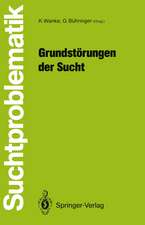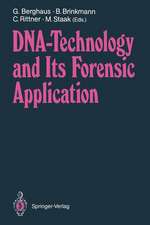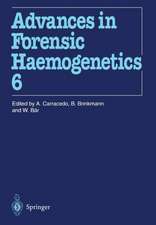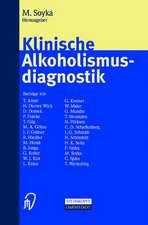Comparative Skeletal Anatomy: A Photographic Atlas for Medical Examiners, Coroners, Forensic Anthropologists, and Archaeologists
Autor Bradley J. Adams Fotografii de G. Santucci Autor Pamela J. Crabtreeen Limba Engleză Hardback – 28 feb 2008
Preț: 1430.16 lei
Preț vechi: 1505.44 lei
-5% Nou
Puncte Express: 2145
Preț estimativ în valută:
273.65€ • 287.25$ • 227.14£
273.65€ • 287.25$ • 227.14£
Carte tipărită la comandă
Livrare economică 10-24 aprilie
Preluare comenzi: 021 569.72.76
Specificații
ISBN-13: 9781588298447
ISBN-10: 1588298442
Pagini: 348
Ilustrații: IX, 348 p.
Dimensiuni: 178 x 254 x 19 mm
Greutate: 0.93 kg
Ediția:2008
Editura: Humana Press Inc.
Colecția Humana
Locul publicării:Totowa, NJ, United States
ISBN-10: 1588298442
Pagini: 348
Ilustrații: IX, 348 p.
Dimensiuni: 178 x 254 x 19 mm
Greutate: 0.93 kg
Ediția:2008
Editura: Humana Press Inc.
Colecția Humana
Locul publicării:Totowa, NJ, United States
Public țintă
Professional/practitionerCuprins
Human vs Horse.- Human vs Cow.- Human vs Bear.- Human vs Deer.- Human vs Pig.- Human vs Goat.- Human vs Sheep.- Human vs Dog.- Human vs Raccoon.- Human vs Opossum.- Human vs Cat.- Human vs Rabbit.- Human vs Turkey.- Human vs Duck.- Human vs Chicken.- Miscellaneous.- Traces of Butchery and Bone Working.
Recenzii
From the reviews:
"The goal is to provide the medico-legal community a resource for the comparison and discrimination of animal and human bone. As the first book of its kind, Comparative Skeletal Anatomy is a well-organized and useful contribution to the forensic literature. … a systematic and logical means of visually comparing the morphology and size of human bones to common animal counterparts. … is both a useful resource for archaeologists and medico-legal specialists, as well as a valuable training text for students of human anatomy and osteology." (Tracy L. Rogers, Canadian Society of Forensic Science Journal, August, 2008)
"The goal is to provide the medico-legal community a resource for the comparison and discrimination of animal and human bone. As the first book of its kind, Comparative Skeletal Anatomy is a well-organized and useful contribution to the forensic literature. … a systematic and logical means of visually comparing the morphology and size of human bones to common animal counterparts. … is both a useful resource for archaeologists and medico-legal specialists, as well as a valuable training text for students of human anatomy and osteology." (Tracy L. Rogers, Canadian Society of Forensic Science Journal, August, 2008)
Textul de pe ultima copertă
Forensic scientists working with human skeletal remains must be able to differentiate between human and non-human bones. Comparative Skeletal Anatomy: A Photographic Atlas for Medical Examiners, Coroners, Forensic Anthropologists, and Archaeologists fills a void in the literature by providing a comprehensive photographic guide of both human and non-human bones that is useful to those working in the fields of archaeology or the forensic sciences. This volume is a photographic atlas of common animal bones and is the first to focus comparatively on both human and animal osteology. Throughout this groundbreaking text, animal bones are photographed alongside the corresponding human bone, allowing the reader to observe size and shape variations. The goal of this guide is to help experienced archaeologists and forensic scientists distinguish human remains from common animal species, including horses, cows, goats, rabbits, chickens, ducks, sheep, and pigs, among others. Comprehensive and timely, Comparative Skeletal Anatomy: A Photographic Atlas for Medical Examiners, Coroners, Forensic Anthropologists, and Archaeologists is sure to become an essential reference for all forensic scientists and archeologists working with human skeletal remains.
Caracteristici
More than 300 illustrations of skeletons First atlas to compare human and animal osteology
